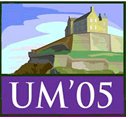
Adapting the Interaction Style to Affective Factors
in conjunction with User Modeling 2005
Edinburgh, UK
July 25, 2005
Call For Papers

 |
Adapting the Interaction Style to Affective Factorsin conjunction with User Modeling 2005Edinburgh, UK
|
 |
| List of
Contributions Program OrganizersSandra Carberry Fiorella de Rosis Program CommitteeElisabeth André Important datesDeadline for paper submissions:March 7, 2005 Notification of acceptance: April 7, 2005 Deadline for camera-ready version: May31, 2005 Workshop date: July 22, 2005 PublicationAll contributions will be made available on this Web site and published as part of an informal Annex to the main UM05 conference proceedings RegistrationParticipants will need to register for the main conference
(UM03). |
Background and Motivation:Workshops on Adaptation to Affective Factors have become almost a
tradition at UM Conferences, with the last three editions (in 1999, 2001
and 2003). The domain has matured considerably in the recent years:
several Workshops have been organized on this topic, in Europe, in the US
and in Asia, and a European Network of Excellence on Emotions, with a core
Consortium of about 40 institutions (HUMAINE), became
operational in 2004. The 2005 edition may add, to the audience of those
who participated in the previous editions, new potential contributors from
this Network.
The goal of this Workshop is to promote comparison of experiences and
discussion on the specific problems which arise in extending user modeling
and adaptation of interaction to affective factors. The spectrum of
factors which may be considered as belonging to the category of 'affect'
is wide. It spans from 'long-term' personality factors to medium and short
term 'moods and emotions', to other aspects which are usually classified
under generic terms such as 'attitudes' (doubt, politeness, deception and
others). While psychologists theorized and investigated experimentally the
domain of 'strong' emotions (fear/hope, love/hate, disgust, to make a few
typical examples), it is likely that the factors which mostly influence
interaction with technology are softer (again to make a few examples,
frustration, concern, cognitive load, satisfaction, doubt) or of a more
generic kind (positive vs negative valence, for instance). This opens the
problem of reflecting on these theories and these experimental results, to
discuss to what extent they apply to softer affective categories.
Recognition of the user state may be based on the observation of various
signs: speech, language, facial expressions, movements, physiological
parameters and their combination. In the majority of cases, context is
fundamental to increase the recognition accuracy. To adapt appropriately
to such states, however, recognition should be integrated with
interpretation: that is, with the ability to hypothesize the causes which
likely produced that state. Recognition should therefore be tightly
integrated with user modeling, to insure a consistent representation of
affective and non affective aspects of the user. Although adaptation to
affective factors may apply, in principle, the same methods which were
applied successfully to other kinds of factors, some specificity exists.
First of all, a decision must be taken on when interaction should aim at
reinforcing or weakening this state. Then, the potential impact of
interaction factors on the affective state of the user should be
investigated and applied appropriately.
This Workshop aims at fostering discussion on the afore mentioned
topics and on others that will emerge as of interest in paper submissions.
Researchers will be encouraged to submit not only descriptions of research
which produced positive results, but also frank reports about studies and
systems that did not work as they were expected to: such reports should
include enough detail about the reasons for failure, to help others to
avoid pursuing the same dead ends. As usual in this domain, integration of
competences and backgrounds will be favored, although user modeling and
adaptation will be the core on which the various positions will confront.
Suggested Topics:Workshop Format:This full-day Workshop will be opened by an Invited Speech and will include a long paper Session and a Poster and Demo Session. It will be concluded with a presentation of the European Network of Excellence on Emotions (HUMAINE), which will provide a European perspective on important issues of this domain relevant to academic and industrial research.The workshop organizers welcome submissions of high-quality papers describing completed or on-going research addressing theories, methods, techniques and results in user emotion and attitude modeling. Both papers and posters may be submitted. Submission of interactive demonstrations is particularly encouraged. Submissions may be sent in one of the following forms:
1. long abstracts of 1000 words maximum. Authors of accepted
papers will then provide full papers for inclusion in the workshop
proceedings. Long abstracts should use a font no smaller than 10 point and
must include the following: 2. If authors wish to submit complete papers rather than long
abstracts, they may do so. Full papers should have a maximum length of
4000 words for long papers and 1500 words for poster and demo submissions,
including figures and tables. Authors should use the APA style of
citations, two-column format and a font no smaller than 10 points.
Submissions should be pdf files and should be sent to both of the
following by email: |